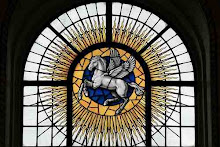
"Ah truth! How terrible a thing it is to know the truth, when it brings only pain!" - Tiresias
For the Greeks, theatre was something very different to what it is now. It was not just a form of entertainment with the opportunity for drinks beforehand and a nice meal with some interesting conversation afterwards, but part of a profound religious festival, that of Dionysus, the god of wine, madness, abandon, poetry and mystical insight. One of the last cults to have taken root in Greece, that of Dionysus was said to have come from the East. It may even have been a form of worship of Siva which had spread Westwards to Europe from India. Greek culture was originally resistant to the female-orientated, anarchic, chaotic nature of Dionysus, but his primal force could not be withstood and by the end of classical Greek culture he was probably the most ubiquitous and honoured god of the pantheon.
 Nietzsche wrote brilliantly about Dionysus in his first piece of work, The Birth Of Tragedy, which is still regarded as a landmark, if a controversial one, in classical studies. For him, Dionysus stood opposed to Apollo as a different way of encountering the chaos of life. Where Apollo represented grace, harmony, the purity of the mind, creativity as generator of sublime illusion whereby the individual is able to transcend the despair and pain of existence by contemplating the Beautiful, Dionysus was pure energy and confusion, sensuality and impulse, the intoxicated leader of a frenzied, ecstatic dance which, in its sheer, exhausting life-affirming energy, enabled the Initiate to transcend in a different way the Abyss that Nietzsche saw haunting the Greek psyche. Both Apollo and Dionysus represented paths to Enlightenment, but in opposite ways.
Nietzsche wrote brilliantly about Dionysus in his first piece of work, The Birth Of Tragedy, which is still regarded as a landmark, if a controversial one, in classical studies. For him, Dionysus stood opposed to Apollo as a different way of encountering the chaos of life. Where Apollo represented grace, harmony, the purity of the mind, creativity as generator of sublime illusion whereby the individual is able to transcend the despair and pain of existence by contemplating the Beautiful, Dionysus was pure energy and confusion, sensuality and impulse, the intoxicated leader of a frenzied, ecstatic dance which, in its sheer, exhausting life-affirming energy, enabled the Initiate to transcend in a different way the Abyss that Nietzsche saw haunting the Greek psyche. Both Apollo and Dionysus represented paths to Enlightenment, but in opposite ways.Greek Theatre was dedicated to Dionysus. At the beginning of each Dionysia, the name of his Festival, a great statue of Dionysus was wheeled onto stage for an opening ceremony. The High Priest of Dionysus sat in a primary position, presiding over the events of the Drama. Greek Theatre was, then, not a celebration of what Yeats called 'an Attic Grace', not sublime, non-cthonic harmony & beauty, but of Chaos, the confrontation of Disharmony, the Irrational, disaster and death. In this confrontation, just as Dionysus was said to grant Enlightenment through Madness, the different protagonists of each play, along with the audience, experienced the Katharsis or 'Purification' that Aristotle spoke of. Dionysus granted his followers a Higher Consciousness through a clear-eyed, unflinching stare into the Abyss...
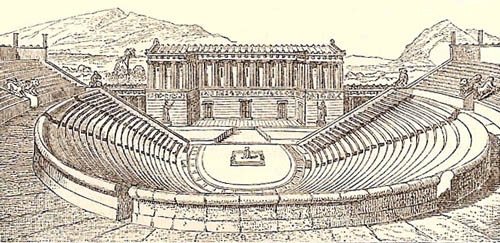 So Greek Theatre was not just 'theatre' as we know it, but a kind of public Mystery. Most who read these pages will know what a 'Mystery' is. It does not mean 'something mysterious', but something Mystical. This may seem like a circular statement, so to explain: a Mystery is the mystical core of a set of beliefs. If the outward forms of a religious or spiritual tradition represent its exoteric manifestation, the Mystery is where the holy of holies is penetrated, where the body and soul moves beyond rational knowledge and somatic awareness into something completely integrated and holistic, where Reason cannot penetrate and instead the Initiate exists in a state of being which is transformative and all-encompassing, a Higher Consciousness as it were. The term derives from the Greek word 'Mysteroi' which meant 'Initiate' and was specific to those who experienced the Eleusinian Mysteries, which gave people a vision of their own immortality. Words break down at this point, as they always do when the Ineffable is said to be encountered. Only experience remains.
So Greek Theatre was not just 'theatre' as we know it, but a kind of public Mystery. Most who read these pages will know what a 'Mystery' is. It does not mean 'something mysterious', but something Mystical. This may seem like a circular statement, so to explain: a Mystery is the mystical core of a set of beliefs. If the outward forms of a religious or spiritual tradition represent its exoteric manifestation, the Mystery is where the holy of holies is penetrated, where the body and soul moves beyond rational knowledge and somatic awareness into something completely integrated and holistic, where Reason cannot penetrate and instead the Initiate exists in a state of being which is transformative and all-encompassing, a Higher Consciousness as it were. The term derives from the Greek word 'Mysteroi' which meant 'Initiate' and was specific to those who experienced the Eleusinian Mysteries, which gave people a vision of their own immortality. Words break down at this point, as they always do when the Ineffable is said to be encountered. Only experience remains.All Greek cults had their Mysteries. Apollo, Aphrodite, Zeus, Hades etc all had them. All were held in secret and jealously guarded, offered only to those who were ready or thought worthy. Of course, elements of the Mysteries were contained in the exoteric rituals of each god as well, just as they are today in exoteric acts such as Communion or Yom Kippur in Christianity and Judaism. But for the deeper Mysteries to be enacted, great preparation was required.
This was why the Dionysia was so unusual. It was a public Mystery, one shared by the general population, like a Christian Passion Play or the enactment of a Katakali Play in a Hindu Temple delineating one of the many stories of the gods. Indeed Greek Drama has many parallels with Katali. It has similar stylisation of faces and movement, a similar context of Holy Rites and adventure story and similar roots within Shamanic Dance and Ritual. Katakali is known to have originated among Hindu Shamanic dances in forests and fields in which Shamen channelled the spirits and energies of the gods. Greek Theatre is thought to have originated in the Dithyramb, a communal celebration of Dionysus in which a Chorus-like assembly of performers hymned and honoured the god. At some stage, legend has it, a single individual, Thespis (from whom we get the word 'Thespian'), is said to have differentiated himself and created a new kind of performance, in which a solo performer interacted with the Dithryamb. As an image of a change in consciousness, of the individual mind suddenly becoming aware of itself and stepping out of the collective identity, it couldn't be more obvious. Jung would have found it fascinating
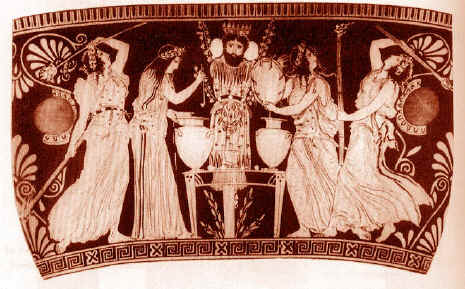 So how does all this relate to Oedipus and his agonising story? Well firstly, if one sees Greek drama as being a public Mystery, then the journey of the characters must be an enactment of that Mystery. The voyage of Oedipus from his position as King to blinded exile and then, ultimately, a hero taken up by the gods, becomes the journey of the individual soul to a semi-divine status possessed of a higher consciousness.
So how does all this relate to Oedipus and his agonising story? Well firstly, if one sees Greek drama as being a public Mystery, then the journey of the characters must be an enactment of that Mystery. The voyage of Oedipus from his position as King to blinded exile and then, ultimately, a hero taken up by the gods, becomes the journey of the individual soul to a semi-divine status possessed of a higher consciousness. But how can this be so? Oedipus' story is one of abject horror. The curse he undergoes is terrifying and cruel. Why must a Mystery demand such suffering? To understand, we have to look at the three-fold structure of the Greek stage itself.
In common with all great eras of Theatre, the Greek stage presented a complete vision of how the Universe was seen at the time. For the Greeks, this was a deeply hierarchic one, but within this there was a holistic conception of how the different levels of reality interacted. If one looks at the stage from an aerial view, one sees that by far the largest part of it was the Chorus, which spread out in a semi-circular apron stage formation into the audience, which radiated out from that in turn. The Chorus was the bridge between the audience and the action. Indeed the Chorus was drawn from the audience, being made up of ordinary Athenians who competed for the honour of being chosen to take part in it.
A Chorus was made up of 14 performers and a Chorus Leader, providing the visual symmetry of two sets of seven with a single Leader at the centre. It used song, dance, music and dialogue throughout the performance of any one Greek tragedy. There were always five Choric Odes, or sequences in which the main action stopped and the Chorus took over, the last of which, fascinatingly, was usually frenzied in some way, as the action mounted towards its climax - eg the Summoning of Dionysus at the end of Antigone or the sudden explosion of the Furies in the Eumenides as they threaten to destroy Athens. The Chorus was always characterised as coming from the mass of the population or its leadership. In Antigone they are Senators, in Electra they are the women of Clytemnestra's house, in Medea they are ordinary women of Corinth and so on.
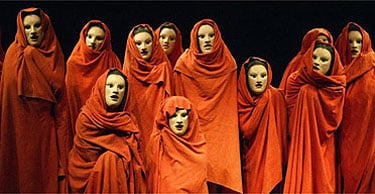 In Oedipus Rex they are population of Thebes. As such, they are of a lower social order than the Heroes who make up the main protagonists of each play. They observe the drama, interact, comment, try to make sense of what is happening, give or withhold support, even try to intervene, but at no point can they change the course of events. They are powerless to do so. There are exceptions, most notably Aeschylus' brilliant use of the Chorus as the Furies in the Eumenides, who become the main characters in the play, or at least among the main characters. The Furies threaten to completely overturn everything and it is their journey from disaffected and abused primal agents of vengeance and chaos to the Kindly Ones, beneficient spirits who preside over Athens, that makes up the main meat of the drama. But this is a one-off. Unless one counts the Bacchants in Euripides' Bacchae, nowhere else do the Chorus have quite such a primary role in the action.
In Oedipus Rex they are population of Thebes. As such, they are of a lower social order than the Heroes who make up the main protagonists of each play. They observe the drama, interact, comment, try to make sense of what is happening, give or withhold support, even try to intervene, but at no point can they change the course of events. They are powerless to do so. There are exceptions, most notably Aeschylus' brilliant use of the Chorus as the Furies in the Eumenides, who become the main characters in the play, or at least among the main characters. The Furies threaten to completely overturn everything and it is their journey from disaffected and abused primal agents of vengeance and chaos to the Kindly Ones, beneficient spirits who preside over Athens, that makes up the main meat of the drama. But this is a one-off. Unless one counts the Bacchants in Euripides' Bacchae, nowhere else do the Chorus have quite such a primary role in the action.The Chorus would never move from the section of the stage reserved for them, even though it is the largest part of it. Above them is the stage of the Heroes. These Heroes - Oedipus, Electra, Antigone, Medea, Ajax etc - are the key human protagonists of the plays. They are mortals, like the Chorus, but of a more individuated, higher status or kind. They have moved beyond the collective experience of the majority of humanity and begun to pursue their own destinies. These characters are invariably great heroic figures like Achilles, Odysseus and/ or aristocrats like Electra, Clytemnestra etc. Just as we watch public figures strut their stuff on the world stage - George W Bush, Barack Obama, Vladimir Putin, Angelina Jolie, Justin Timberlake - so the Chorus and the audience watched the Heroes follow their own paths, unable to intervene, but always able to interact. On the Greek stage, this 'elevated' status was reflected by the raised platform they would have appeared on. So, in the opening scene of Oedipus Rex, when Oedipus speaks to the people of Thebes who have come for his help in dealing with the plague that has afflicted their city, he would have stood above them, talking down to them, just as a modern leader or politician would.

Just as at no point could this division between Chorus and Heroes be breached, above the Heroes stood another unbreachable divide - the level of the Gods. This was where the different deities of the Greek Pantheon - Apollo, Zeus, Athena etc - would appear, if appear they did in any given drama, on a stage reached by a single entrance at the centre of the back wall for maximum effect. When manifest, the Gods would address the Heroes and Chorus from this elevated platform and, once again, there would be no crossing from one level to another. Of course, sometimes there were exceptions, especially in the work of Euripides, who delighted in subverting the rules of the Theatre he had inherited. In his Bacchae Dionysus is able to walk among the Heroes for much of the play because he has disguised himself as a High Priest of his own cult. But when he reveals himself at the end having exacted his terrible revenge on Cadmus and his family, he would have appeared on the higher level of the Gods. Similarly in Medea, Medea appears among the Gods having killed her two children in order to punish Jason. Euripides got into huge trouble for writing this, as not only had he violated the Divine Order set out on the Greek stage,but had suggested that a woman could be elevated by the Gods for having committed such an appalling murder. Thus he was accused of immorality, nihilism, blasphemy, sacrilege and misogyny. Such was Euripides' darkly subversive intent.
So we see how the very structure of the Greek theatre expressed their vision of how the Universe worked. Gods, Heroes and the general mass of humanity interacted in a hierarchic but also holistic whole. Of course, the Gods didn't always appear physically in these plays. More often than not their lurked behind the play, invisible presences, communicating themselves through third parties - Tiresias, for instance, or the Oracle - or, as in Oedipus At Colonus, voices that are encountered by key characters. But they were always there, effecting and affecting the proceedings.
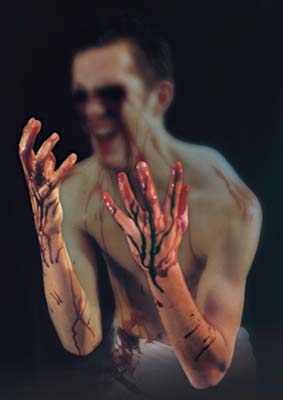 But the multi-layered genius of Greek theatre didn't stop here. For although the architecture expressed this unified but layered vision of the Macrocosmic Universe, it also expressed its Microcosm - the inner man itself. Just as sacred sites of all kinds, from Christian Churches to Hindu Temples, are designed along the dimensions of the Cosmic Man (Christ and Purusha respectively), so the Greek stage was designed to express Microcosmic Man, the Anthropos, us. For the three-fold nature of the Chorus/ Heroes/ Gods conception of existence was paralleled in the three-fold nature of the human organism as conceived by the esoteric doctrine of the time.
But the multi-layered genius of Greek theatre didn't stop here. For although the architecture expressed this unified but layered vision of the Macrocosmic Universe, it also expressed its Microcosm - the inner man itself. Just as sacred sites of all kinds, from Christian Churches to Hindu Temples, are designed along the dimensions of the Cosmic Man (Christ and Purusha respectively), so the Greek stage was designed to express Microcosmic Man, the Anthropos, us. For the three-fold nature of the Chorus/ Heroes/ Gods conception of existence was paralleled in the three-fold nature of the human organism as conceived by the esoteric doctrine of the time.  For the Greeks, as I mentioned in my earlier post about the Soul, Man was made up of Soma, Psyche and Pneuma. Soma was the Body, our physical form, which carried the Image, or 'Eidolon' that was our physical manifestation. This corresponded with the Chorus, with its passions, its its fears and its hopes. Next was the Psyche, or Soul, which the Greeks identified as the source of everything that was us in the inner man; emotions, feelings, reason, the receptacle of experience, memory, language, intuition, creativity, identity. This, they believed, had its seat in the Heart. Last was the Pneuma, or Spirit, that part of us which opens out onto the Eternal, which outlives the Soma and Psyche and partakes of the Divine, the repository of the Higher Consciousness. This, they believed, emanated from the Head. Keen students of Vedanta will recognise parallels with the Chakra system. Those who know their Gnosticism will remember the way in which certain Gnostic sects separated people into three different categories - Hylics, Psychics and Pneumatics...
For the Greeks, as I mentioned in my earlier post about the Soul, Man was made up of Soma, Psyche and Pneuma. Soma was the Body, our physical form, which carried the Image, or 'Eidolon' that was our physical manifestation. This corresponded with the Chorus, with its passions, its its fears and its hopes. Next was the Psyche, or Soul, which the Greeks identified as the source of everything that was us in the inner man; emotions, feelings, reason, the receptacle of experience, memory, language, intuition, creativity, identity. This, they believed, had its seat in the Heart. Last was the Pneuma, or Spirit, that part of us which opens out onto the Eternal, which outlives the Soma and Psyche and partakes of the Divine, the repository of the Higher Consciousness. This, they believed, emanated from the Head. Keen students of Vedanta will recognise parallels with the Chakra system. Those who know their Gnosticism will remember the way in which certain Gnostic sects separated people into three different categories - Hylics, Psychics and Pneumatics...So the Greek's conceived of the interior nature of humankind, which was always seen as the Microcosm of the Macrocosm which was the wider Universe. Man reflected the Cosmos and vice versa. Herein lay the true secret of the Mystery of Dionysus as expressed in the drama. Each play was not just the story of an external series of events, but that of an interior journey. Apollo, Athena, Oedipus, the Furies were internal as well as external realities. The process of death and transformation that took place on stage was supposed to take place within the minds of the spectators. The drama was a psychodrama, or rather, a psycho-spiritual drama.
And it is with this understanding of the many levels upon which Greek drama operated that the possibility of a new way of experiencing Oedipus Rex emerges...

